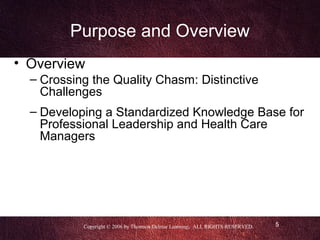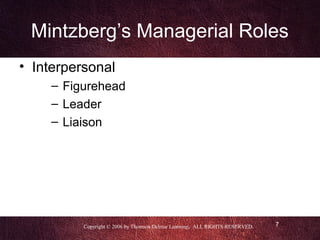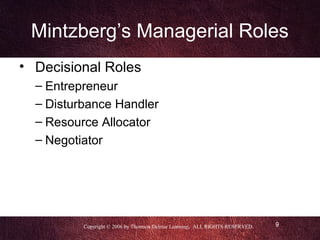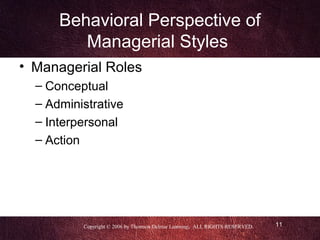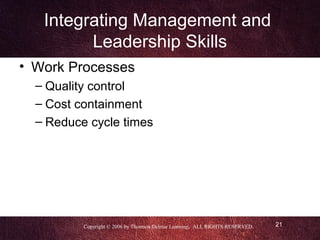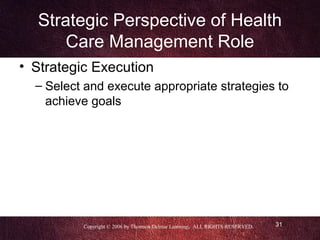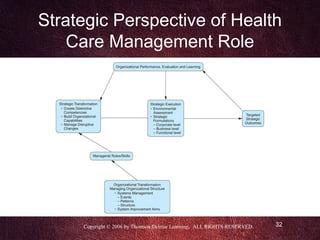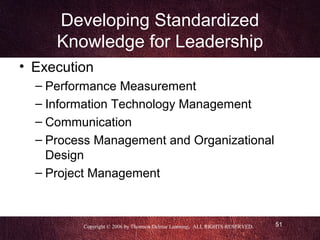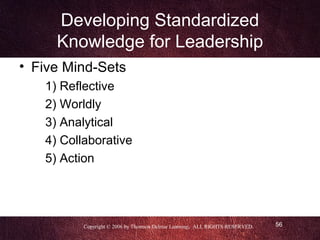Managerial approach
- 2. Purpose and Overview • Purpose – To understand roles of the health care manager • Executive leadership • Organizational management • Strategic management • Business enterprises • Clinical and business service components Copyright © 2006 by Thomson Delmar Learning. ALL RIGHTS RESERVED. 2
- 3. Purpose and Overview • Overview – Behavioral Perspective – The Practice of Management: Integrating Organizational Process Management and Leadership Roles and Skills Copyright © 2006 by Thomson Delmar Learning. ALL RIGHTS RESERVED. 3
- 4. Purpose and Overview • Overview – Strategic Perspective of Health Care Management – Health Care’s Distinctive Context and Executive Leadership Requirements Copyright © 2006 by Thomson Delmar Learning. ALL RIGHTS RESERVED. 4
- 5. Purpose and Overview • Overview – Crossing the Quality Chasm: Distinctive Challenges – Developing a Standardized Knowledge Base for Professional Leadership and Health Care Managers Copyright © 2006 by Thomson Delmar Learning. ALL RIGHTS RESERVED. 5
- 6. Behavioral Perspective of the Managerial Role • Integrated and applied activity within a dynamic and evolving system Copyright © 2006 by Thomson Delmar Learning. ALL RIGHTS RESERVED. 6
- 7. Mintzberg’s Managerial Roles • Interpersonal – Figurehead – Leader – Liaison Copyright © 2006 by Thomson Delmar Learning. ALL RIGHTS RESERVED. 7
- 8. Mintzberg’s Managerial Roles • Informational Roles – Monitor – Disseminator – Spokesperson Copyright © 2006 by Thomson Delmar Learning. ALL RIGHTS RESERVED. 8
- 9. Mintzberg’s Managerial Roles • Decisional Roles – Entrepreneur – Disturbance Handler – Resource Allocator – Negotiator Copyright © 2006 by Thomson Delmar Learning. ALL RIGHTS RESERVED. 9
- 10. Mintzberg’s Model of Management • Person • Frame of job • Agenda of work Copyright © 2006 by Thomson Delmar Learning. ALL RIGHTS RESERVED. 10
- 11. Behavioral Perspective of Managerial Styles • Managerial Roles – Conceptual – Administrative – Interpersonal – Action Copyright © 2006 by Thomson Delmar Learning. ALL RIGHTS RESERVED. 11
- 12. Behavioral Perspective of Managerial Styles • How Managers Perform Roles – Linking – Conceiving – Leading Copyright © 2006 by Thomson Delmar Learning. ALL RIGHTS RESERVED. 12
- 13. Behavioral Perspective of Managerial Styles • Managerial Approaches to Action – Deductive – Inductive Copyright © 2006 by Thomson Delmar Learning. ALL RIGHTS RESERVED. 13
- 14. Behavioral Perspective of Managerial Styles • Management Mind-Sets – Reflective – Analytic – Worldly – Collaborative – Action Copyright © 2006 by Thomson Delmar Learning. ALL RIGHTS RESERVED. 14
- 15. Integrating Management and Leadership Skills • Systemic Organization Structure – Mission – Strategies, goals, and accountabilities – Production function – Strategic affiliations – Organizational culture Copyright © 2006 by Thomson Delmar Learning. ALL RIGHTS RESERVED. 15
- 16. Integrating Management and Leadership Skills Copyright © 2006 by Thomson Delmar Learning. ALL RIGHTS RESERVED. 16
- 17. Integrating Management and Leadership Skills • Direction-Setting Processes – Learning about the organization – Framing an agenda – Aligning individuals – Framing, testing, and revising initiatives Copyright © 2006 by Thomson Delmar Learning. ALL RIGHTS RESERVED. 17
- 18. Integrating Management and Leadership Skills • Negotiating and Selling Processes – Framing issues – Soliciting help and presenting proposals – Building and maintaining contacts and communication – Building and managing coalitions Copyright © 2006 by Thomson Delmar Learning. ALL RIGHTS RESERVED. 18
- 19. Integrating Management and Leadership Skills • Monitoring and Controlling Processes – Ensuring organizational operation as planned – Detect unexpected shocks and disturbances – Initiation of corrective action – Restoration of organizational equilibrium Copyright © 2006 by Thomson Delmar Learning. ALL RIGHTS RESERVED. 19
- 20. Integrating Management and Leadership Skills • Work Processes – Customers – Transformations – Supply-chain systems serving customers requiring alignment to achieve mutual support Copyright © 2006 by Thomson Delmar Learning. ALL RIGHTS RESERVED. 20
- 21. Integrating Management and Leadership Skills • Work Processes – Quality control – Cost containment – Reduce cycle times Copyright © 2006 by Thomson Delmar Learning. ALL RIGHTS RESERVED. 21
- 22. Integrating Management and Leadership Skills • Work Processes – Enhance operating performance – Decrease fragmentation – Improve cross-functional integration Copyright © 2006 by Thomson Delmar Learning. ALL RIGHTS RESERVED. 22
- 23. Integrating Management and Leadership Skills • Organizational & Behavioral Processes – Decision making – Communication – Organizational learning Copyright © 2006 by Thomson Delmar Learning. ALL RIGHTS RESERVED. 23
- 24. Integrating Management and Leadership Skills • Organizational & Change Processes – Creation – Growth – Transformation – Decline Copyright © 2006 by Thomson Delmar Learning. ALL RIGHTS RESERVED. 24
- 25. Integrating Management and Leadership Skills • Organizational Management Work – Coping with complexity: good management helps to ensure organization’s survival Copyright © 2006 by Thomson Delmar Learning. ALL RIGHTS RESERVED. 25
- 26. Integrating Management and Leadership Skills • Executive Leader Roles – “Organizational system manager-in chief”’ – “Boundary spanner-in chief” – “Resource developer/investor-in chief” – “Transformation manager-in chief” Copyright © 2006 by Thomson Delmar Learning. ALL RIGHTS RESERVED. 26
- 27. Integrating Management and Leadership Skills Copyright © 2006 by Thomson Delmar Learning. ALL RIGHTS RESERVED. 27
- 28. Strategic Perspective of Health Care Management Role • Defines strategic goals for organization’s survival and growth • Apply strategic management concepts Copyright © 2006 by Thomson Delmar Learning. ALL RIGHTS RESERVED. 28
- 29. Strategic Perspective of Health Care Management Role • Organizational Transformation – Strategic planning to manage evolution of organization over time – Apply continuous judgment in ongoing operations Copyright © 2006 by Thomson Delmar Learning. ALL RIGHTS RESERVED. 29
- 30. Strategic Perspective of Health Care Management Role • Strategic Transformation – Identify opportunities to develop new competencies – Allow organization to create and experiment – Maintain sustainable competitive advantage Copyright © 2006 by Thomson Delmar Learning. ALL RIGHTS RESERVED. 30
- 31. Strategic Perspective of Health Care Management Role • Strategic Execution – Select and execute appropriate strategies to achieve goals Copyright © 2006 by Thomson Delmar Learning. ALL RIGHTS RESERVED. 31
- 32. Strategic Perspective of Health Care Management Role Copyright © 2006 by Thomson Delmar Learning. ALL RIGHTS RESERVED. 32
- 33. Health Care’s Distinctive Context and Executive Leadership Requirements Copyright © 2006 by Thomson Delmar Learning. ALL RIGHTS RESERVED. 33
- 34. Health Care’s Distinctive Context and Executive Leadership Requirements • Managing Clinical and Technology-Based Production Systems – Core “production work” to provide safe, effective, efficient clinical services Copyright © 2006 by Thomson Delmar Learning. ALL RIGHTS RESERVED. 34
- 35. Health Care’s Distinctive Context and Executive Leadership Requirements • Managing Organizational Complexity – Complex and strongly resource-dependent organizations – Monitor and evaluate safety, effectiveness, and efficiency – Intervene to improve services and ensure accountability Copyright © 2006 by Thomson Delmar Learning. ALL RIGHTS RESERVED. 35
- 36. Health Care’s Distinctive Context and Executive Leadership Requirements • Providing Value-Oriented Leadership – Health delivery organizations – Executive leadership Copyright © 2006 by Thomson Delmar Learning. ALL RIGHTS RESERVED. 36
- 37. Challenges Facing Health Service Managers • Institute of Medicine’s (IOM) Report: To Err is Human: Building a Safer Health System – 44,000–98,000 annual deaths from preventable medical errors – Ranked as nation’s eighth-leading cause of death Copyright © 2006 by Thomson Delmar Learning. ALL RIGHTS RESERVED. 37
- 38. Challenges Facing Health Service Managers • IOM Recommendations – Design safe systems of care – Provide leadership – Respect human limits in process design Copyright © 2006 by Thomson Delmar Learning. ALL RIGHTS RESERVED. 38
- 39. Challenges Facing Health Service Managers • IOM Recommendations – Promote team functioning – Anticipate the unexpected – Create a learning environment Copyright © 2006 by Thomson Delmar Learning. ALL RIGHTS RESERVED. 39
- 40. Challenges Facing Health Service Managers • IOM Design Principles – Standardize and simplify equipment, supplies, and processes – Establish team training programs – Implement non-punitive systems for reporting and analyzing errors Copyright © 2006 by Thomson Delmar Learning. ALL RIGHTS RESERVED. 40
- 41. Challenges Facing Health Service Managers • IOM Report: Crossing the Quality Chasm: A New Health System for the 21st Century • Health care services should be safe, effective, patient-centered, timely, efficient, and equitable Copyright © 2006 by Thomson Delmar Learning. ALL RIGHTS RESERVED. 41
- 42. Challenges Facing Health Service Managers • IOM Report: Crossing the Quality Chasm • Six challenges: 1) Redesign care processes 2) Use information technologies 3) Manage clinical knowledge and skills Copyright © 2006 by Thomson Delmar Learning. ALL RIGHTS RESERVED. 42
- 43. Challenges Facing Health Service Managers • IOM Report: Crossing the Quality Chasm • Six challenges: 4) Develop effective teams 5) Coordinate care 6) Incorporate performance and outcome measurements throughout operations Copyright © 2006 by Thomson Delmar Learning. ALL RIGHTS RESERVED. 43
- 44. Challenges Facing Health Service Managers Copyright © 2006 by Thomson Delmar Learning. ALL RIGHTS RESERVED. 44
- 45. Developing Standardized Knowledge for Leadership • Adaptation and transformation require development of leadership competencies Copyright © 2006 by Thomson Delmar Learning. ALL RIGHTS RESERVED. 45
- 46. Developing Standardized Knowledge for Leadership • Skill Sets Managers Need to Succeed – Technical – Human relations – Team management – Facilitating and managing groups – Conceptual Copyright © 2006 by Thomson Delmar Learning. ALL RIGHTS RESERVED. 46
- 47. Developing Standardized Knowledge for Leadership • Chief Executive Officer Must – Effectively balance conflict – Effectively strategize – Adapt to change Copyright © 2006 by Thomson Delmar Learning. ALL RIGHTS RESERVED. 47
- 48. Developing Standardized Knowledge for Leadership • Competencies for Leadership Transformation – Achievement Orientation – Analytical Thinking – Community Orientation – Information Seeking Copyright © 2006 by Thomson Delmar Learning. ALL RIGHTS RESERVED. 48
- 49. Developing Standardized Knowledge for Leadership • Competencies for Leadership Transformation – Innovative Thinking – Strategic Orientation – Financial Skills Copyright © 2006 by Thomson Delmar Learning. ALL RIGHTS RESERVED. 49
- 50. Developing Standardized Knowledge for Leadership • Execution – Accountability – Change Leadership – Collaboration – Impact and Influence – Initiative – Organizational Awareness Copyright © 2006 by Thomson Delmar Learning. ALL RIGHTS RESERVED. 50
- 51. Developing Standardized Knowledge for Leadership • Execution – Performance Measurement – Information Technology Management – Communication – Process Management and Organizational Design – Project Management Copyright © 2006 by Thomson Delmar Learning. ALL RIGHTS RESERVED. 51
- 52. Developing Standardized Knowledge for Leadership • People – Interpersonal Understanding – Professionalism – Relationship Building – Self-Confidence Copyright © 2006 by Thomson Delmar Learning. ALL RIGHTS RESERVED. 52
- 53. Developing Standardized Knowledge for Leadership • People – Self Development – Talent Development – Team Leadership – Human Resources Management Copyright © 2006 by Thomson Delmar Learning. ALL RIGHTS RESERVED. 53
- 54. Developing Standardized Knowledge for Leadership Copyright © 2006 by Thomson Delmar Learning. ALL RIGHTS RESERVED. 54
- 55. Developing Standardized Knowledge for Leadership • Competency Development – Career-long action-based reflective activity – Gained through a life-long process of experience-based reflection and growth Copyright © 2006 by Thomson Delmar Learning. ALL RIGHTS RESERVED. 55
- 56. Developing Standardized Knowledge for Leadership • Five Mind-Sets 1) Reflective 2) Worldly 3) Analytical 4) Collaborative 5) Action Copyright © 2006 by Thomson Delmar Learning. ALL RIGHTS RESERVED. 56
Editor's Notes
- Chapter 2
- Chapter 2
- Chapter 2
- Chapter 2
- Chapter 2
- Chapter 2
- Chapter 2
- Chapter 2
- Chapter 2
- Chapter 2
- Chapter 2
- Chapter 2
- Chapter 2 Deductive approaches: Cerebral or deliberate style Inductive approaches: Insightful style
- Chapter 2 A “reflective” mindset in managing “self” An “analytic” mindset in managing organizations or organizational units A “worldly” mindset to aid in managing organizational context A “collaborative” mindset to aid in managing relationships An “action” mindset to assist in managing organizational change and transformation.
- Chapter 2
- Chapter 2
- Chapter 2 Learning about the organization and its problems through a broad range of interactions and assessments and continued probing Framing an agenda to be pursued through conscious reflection and intuitive experience Aligning individuals through communication, motivation, rewards, and punishments, often using new or established communication processes Framing, testing, and revising initiatives
- Chapter 2 Framing and presentation of issues and proposals Deciding how to solicit help and present proposals in ways that appeal to others yet meet one’s basic objectives Building and maintaining network contacts and communication processes Building and managing coalitions Applying these in horizontal and vertical organizational contexts
- Chapter 2
- Chapter 2
- Chapter 2
- Chapter 2
- Chapter 2 Decision making processes Communication processes nature, direction, and quality of information flows Interrelationships Tenor and tone of group work Organizational learning Knowledge acquisition Knowledge interpretation Knowledge dissemination Knowledge retention
- Chapter 2
- Chapter 2
- Chapter 2
- Chapter 2
- Chapter 2
- Chapter 2
- Chapter 2
- Chapter 2
- Chapter 2
- Chapter 2
- Chapter 2
- Chapter 2
- Chapter 2 Health delivery organizations Must ultimately strike a balance between investing in their ability to generate economic profits and investing in their commitment to meet community service needs. Executive leadership Must exhibit value-oriented decision-making, human relations, and priority-setting skills.
- Chapter 2
- Chapter 2
- Chapter 2
- Chapter 2
- Chapter 2
- Chapter 2
- Chapter 2
- Chapter 2
- Chapter 2
- Chapter 2
- Chapter 2 Effective in balancing conflicting values within the organization to create an efficient operating environment An effective strategist... to provide the framework and direction for overall company operations Must change his management style and strike different balances among his personal skills as conditions change or as his organization grows in size and complexity
- Chapter 2
- Chapter 2
- Chapter 2
- Chapter 2
- Chapter 2
- Chapter 2
- Chapter 2
- Chapter 2 A Career-Long Action-Based Reflective Activity, Conducted within an Integrating Framework Does not simply occur, competencies are gained through a life-long process of experience-based reflection and growth
- Chapter 2 Reflective about self Worldly about context Analytical about organization Collaborative about relationships Action about change




